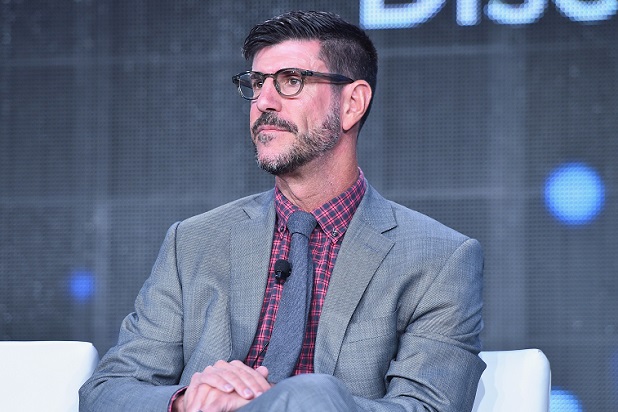 He had only been on the job for 72 hours, but the new president of Discovery Channel wasted no time in pointing a new direction.
He had only been on the job for 72 hours, but the new president of Discovery Channel wasted no time in pointing a new direction.
The network had been marred by fake documentaries like “Mermaids: The Body Found” which did so well in 2012 it was followed by the equally bogus “Mermaids: The New Evidence” in 2013.
Its popular Shark Week brand had been tarnished by the generally discredited “Megalodon: The Monster Shark Lives” that followed the same fake documentary format — and became the highest rated film associated with the event. So it, too, had a sequel last year with “Megalodon: The New Evidence” of which there was none.
And then there was the bizarre “Eaten Alive” special last year which was advertised as a man being swallowed alive by an anaconda before TV cameras. In that one, he never was eaten (and because it was shot earlier and that outcome was known, it shouldn’t have been hyped as something that would happen).
All this on a 30-year old cable staple that created “MythBusters,” “Dirty Jobs” and “Deadliest Catch.”
But the first thing Rich Ross said in his executive session at the TV Critics winter press tour was “the most important thing that this network, the flagship of this company, can stand for is, if there was one word, it would be authentic. And it’s really important that we look into this incredible brand and all the programming that we make and make sure that’s what we stand for. And it’s a filter in which we’re looking at everything we have on the air and everything we’re talking about moving forward.
Then I asked him specifically about “Mermaids.”
“I don’t think it’s actually right for Discovery Channel, and it’s something that I think has, in some ways, run its course,” he relied, in a statement that indicated curtains for the fake documentaries from now on. “I don’t think you’ll be sitting with me here next year asking this question about something I put on, whether it’s a series or a special. So I think they’ve done very well, many of them, but it’s not something really, I think, is right for us.”
Later he said, he had already put his thoughts into action.
” I announced this morning the hire of one of the top documentarians and storytellers, John Hoffman, who has a long history of telling great, authentic stories and working with scientists, doctors and everybody in between,” Ross said. “It was not just a signal. It was a message that is very important to us and very important to me, that when people are telling those stories, they’re delivering information that is true, entertaining as well, which is also mandatory, of course.”
Along those lines, he says he wants to widen the appeal of the network. ” I think the Discovery Channel, that I’ve come into, was it is more narrowly niched than I think it ever needs to be or should be,” Ross said. “And I think being more inclusive to women, to younger men, is the way for us to build back the audience to being a No.1 TV brand, a No. 1 brand that is for the whole family and not just for the men in the family.”
Finally, he was asked about “Eaten Alive.”
“The way I look at it,” Ross says, “was it was the right intention with a packaging that was misleading. Paul Rosolie cares deeply about snakes and wanted to draw attention. You draw attention, to me, [by] telling provocative stories. You don’t have to be so sensational and over-promise.
“I think in his mind he thought that was actually possible,” Ross said. “But I then think the fervor of that story got out of control. So I think whether it’s about a title with a question mark, for me I’d rather be in a situation where the story is clearer, it is what you want to watch, but you don’t expect at the end of it something that can’t possibly happen.”
Will it ever be tried again?
“I don’t believe you’ll be seeing a person eaten by a snake during my time,” Ross said.